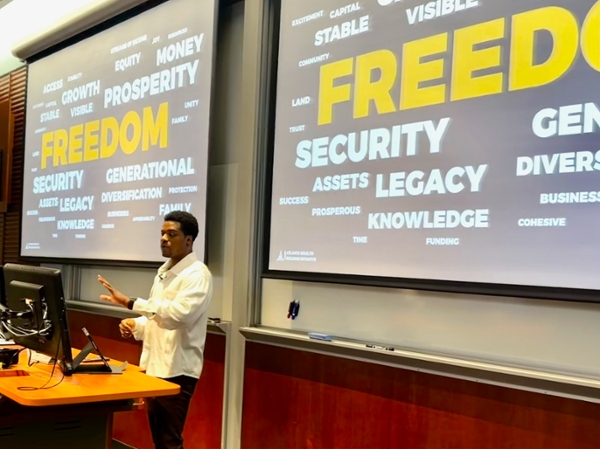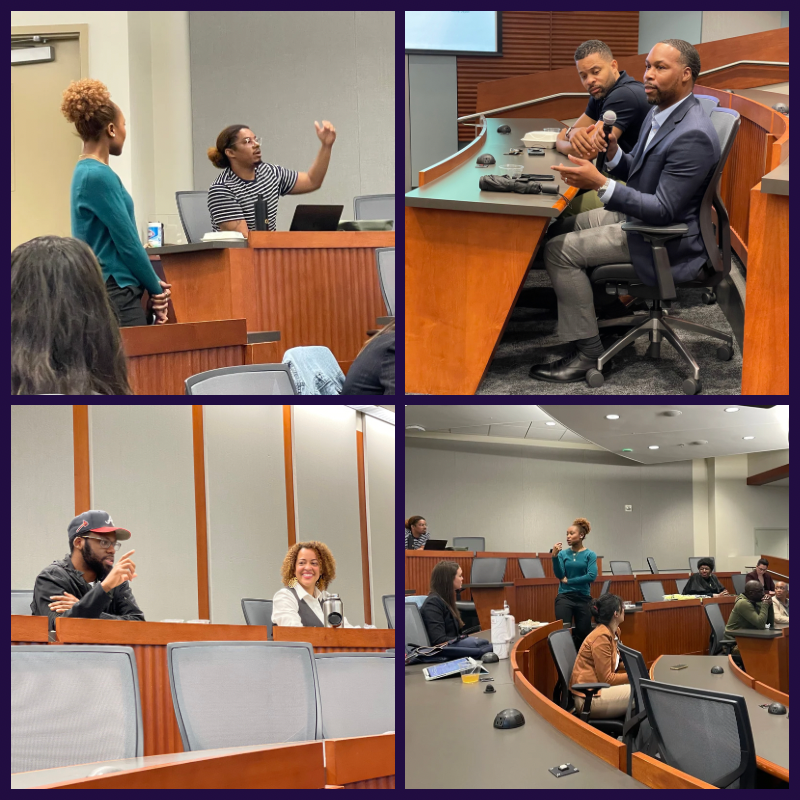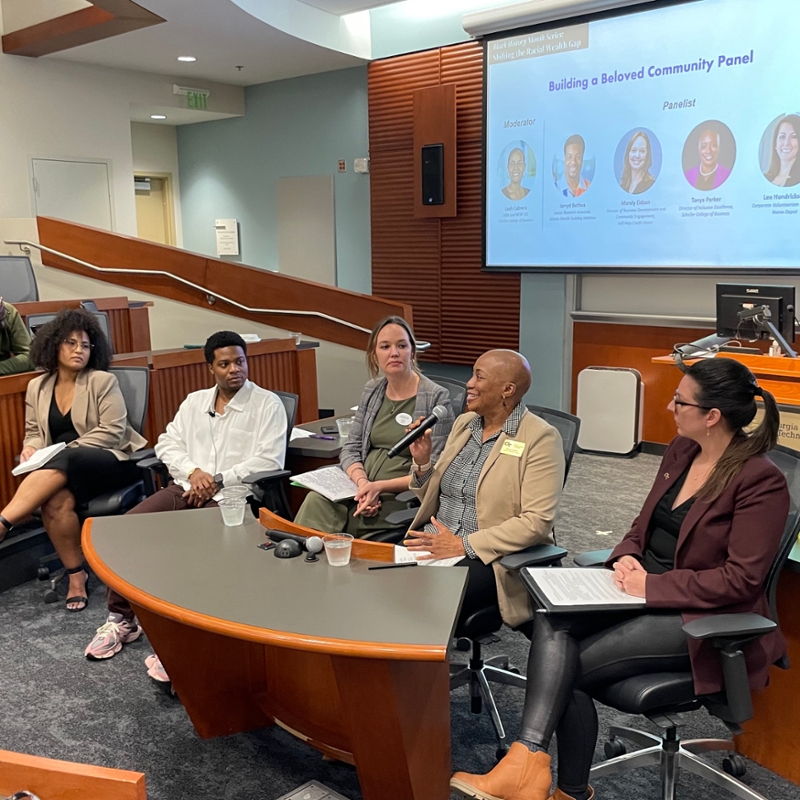Student groups from the Georgia Tech Scheller College of Business gathered on February 28 for a program focused on closing the racial wealth gap. The special event for students, “Shifting the Racial Wealth Gap: Building a Beloved Economy,” was part of Scheller’s Black History Month Series. The event was organized by Blacks in Business in partnership with Women in Business, the Net Impact – MBA Chapter, Scheller Pride, and the Veterans Club.
The program is the sixth annual student-led event focused on closing the racial wealth gap. Since the first annual event, which was organized jointly by Blacks in Business and Net Impact, the event has expanded to include other student clubs and to focus on different angles of equity.
Painting a Picture of the Racial Wealth Gap
The keynote address was delivered by Jarryd Bethea, senior research associate at the Atlanta Wealth Building Initiative. Bethea’s experience includes scaling social impact initiatives, solving growing social inequities, and building relationships between businesses and the communities they serve. He shared findings from the report, Building A Beloved Economy: A Baseline and Framework for Building Black Wealth in Atlanta.
Having grown up in metro Atlanta, Bethea called advocating for Black residents of Atlanta “personal – and a labor of love.” His talk provided an overview of the state of wealth, poverty, income, debt, access to capital, housing, business ownership, and jobs in Atlanta.
Bethea defined his work with the Atlanta Wealth Building Initiative as “community-based, participatory research.” He said, “We are working with the communities we are seeking to uplift.” When community members were asked to define “wealth” with a word, the most common answer was “freedom.” Bethea and colleagues used this discovery to orient themselves in their work, equating the acquisition of wealth with the pursuit of freedom.

The report collaborators also approached their work through the lens of systemic racism – acknowledging its effects on the society we live in.
“Facing our future, the facts and statistics are harrowing,” said Bethea. Atlanta is still one of the most segregated cities in the country by geography. The wealth of Atlanta’s white residents is 46 times the wealth of Black residents. Nearly half of all Black Atlanta residents have delinquent debt. More than one in four Black households in Atlanta are in poverty. Atlanta’s income divide between Black and white households continues to grow. “Affordable housing” is not really affordable for a large portion of the city's residents.
Bethea shared the report’s recommendations for wealth-building strategies. Policy recommendations include baby bonds to change the curve of intergenerational poverty, a publicly funded guaranteed income program, the promotion of policies that support asset-building jobs for workers, the elimination of predatory lending practices, investment in equitable development, reimagining the economy so it prioritizes community wealth, and more.
Educating MBA Students on How to Be Changemakers
The second portion of the program was the panel discussion, “Building a Beloved Community.” The conversation focused on how individuals, corporations, and community organizations can assist with racial economic mobility. Bethea joined the panel, which also included Mandy Eidson (director of business development and community engagement, Self-Help Credit Union), Lee Hendrickson, MBA ’19, (corporate volunteerism manager, The Home Depot), and Tonya Parker (director of inclusive excellence, Scheller College). The panel was moderated by Leah Cabrera, president of Blacks in Business.
On the heels of Bethea’s keynote, Cabrera remarked, “We just learned a lot about how deep the racial wealth gap is in Atlanta. As future leaders, how can we become better change agents and members of the Atlanta community?” She also asked the panelists to address challenges and how their work advances equity.
Parker, Scheller College’s director of inclusive excellence, said, “What I’ve been doing in my line of work is really about building and sustaining inclusive environments, and it has to do with a personal level of honesty and integrity built on the trust that people have in you to do it fairly and with an open mind.” One lesson she has learned over the years is that “everyone has to start with themselves first because the work is inside-out.”

Eidson is passionate about the wealth-building effects of homeownership. The nonprofit she works for addresses the racial wealth gap by helping government and philanthropic dollars serve homebuyers in low-income communities. She addressed a current backlash against DEI initiatives. She said, “With affirmative action struck down, DEI is under threat.” She said that a creative approach is helpful. Her organization now says that it helps “first-generation homebuyers,” many of whom just happen to be people of color.
Parker concurred, “It seems as if I’m always fighting an uphill battle when I must explain or defend what I do.” The work is beneficial for everyone in the shared space.
Hendrickson reflected on the work she contributes within the nonprofit arm of a large corporation. She says that in Home Depot’s volunteer efforts, “We leverage our expertise.” One of the programs that resonates with the issues Bethea brought up is a program called House Proud, which supports Atlanta residents facing adversity and housing challenges. “We help them with repairs to help residents age in place. We can help them hold onto that asset [a home] in order to build generational wealth. We want to preserve their assets in the communities they helped to found. It’s an incredible opportunity to serve our neighbors in that way,” she reflected.
Panelists discussed many ways students can drive change. These include making the most of matching gifts, buying local, teaching financial literacy, sharing tech skills with nonprofits, and volunteering.
While the event was sobering, it also provided helpful advice for the changemakers in the audience. Getting others to pay attention to the problem of the wealth gap is one of the first steps toward progress. Eidson told attendees that when she is talking to individuals who are not sympathetic to the cause, she tells them, “This should be important to you – because it affects all of us.”
Blacks in Business and the Net Impact – MBA Chapter are sponsored and advised student groups within the Ray C. Anderson Center for Sustainable Business.
Written by Jennifer Holley Lux. Photographs by Jennifer Holley Lux and Arianna Robinson.
